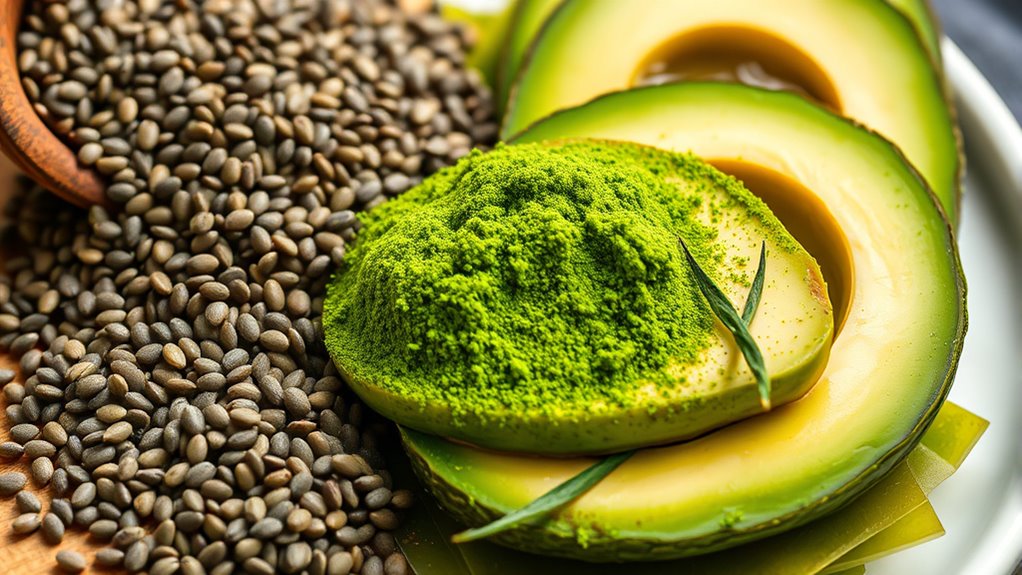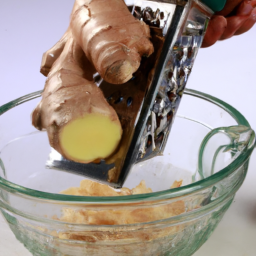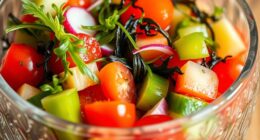On a vegan diet, you can get omega‑3 fats from plant sources like chia seeds, flaxseeds, walnuts, and hemp seeds, which supply ALA, a precursor to EPA and DHA. To boost your intake of these essential fats, consider algae-based supplements or fortified foods with preformed DHA and EPA, and incorporate seaweed into your meals. In this guide, you’ll discover how to optimize absorption and maintain a balanced vegan omega‑3 plan.
Key Takeaways
- Vegan sources of omega-3s include plant-based ALA-rich foods like flaxseeds, chia seeds, walnuts, and hemp seeds.
- Algae-based supplements provide direct EPA and DHA, offering a sustainable alternative to fish-derived omega-3s.
- Incorporating seaweed into meals boosts omega-3 intake along with essential minerals and vitamins.
- Fortified foods and plant oils, such as algal oil and flaxseed oil, enhance omega-3 consumption for vegans.
- Pairing omega-3-rich plant foods with healthy fats improves absorption and overall nutrient balance.
The Importance of Omega‑3s for Vegans

Omega-3 fatty acids are essential for your health, and since your body can’t produce them on its own, you need to get enough through your diet. These fats play a critical role in brain function, heart health, and reducing inflammation. Understanding omega‑3 synthesis is indispensable because your body relies on converting certain precursors into active forms like EPA and DHA. This process involves omega‑3 metabolism, which varies among individuals and can be less efficient in vegans. Without sufficient intake, you risk deficiencies that may impair cognitive function or increase cardiovascular risks. Consequently, it’s important to include reliable sources of omega-3s in your diet, such as algae or fortified foods, to support proper omega‑3 synthesis and metabolism for peak health. Incorporating plant-based options like flaxseeds, chia seeds, and walnuts can also aid in omega-3 conversion, though their effectiveness depends on individual metabolic factors. Additionally, understanding the omega‑3 synthesis process can help you optimize your dietary choices to ensure adequate EPA and DHA levels, especially considering that dietary sources vary in their efficiency of providing these essential fats. Being aware of omega‑3 metabolism can help you tailor your intake for better health outcomes. Moreover, research shows that vegans may have less efficient conversion rates, making it even more important to choose sources that support optimal absorption and utilization.
Plant-Based Sources of Alpha-Linolenic Acid (ALA)
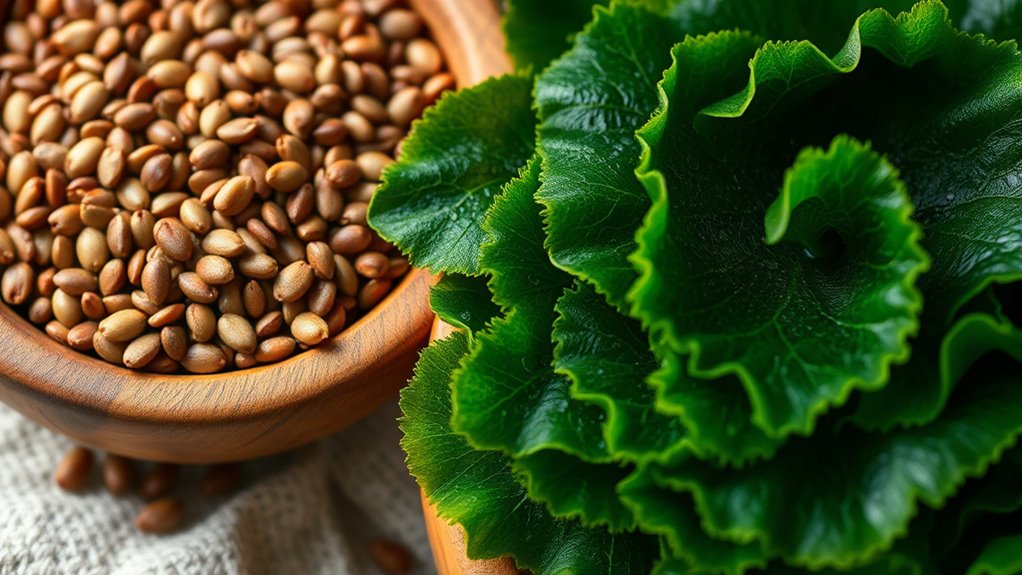
Since your body can convert plant-based precursors into active omega-3 forms, including Alpha-Linolenic Acid (ALA) in your diet is essential for vegans. Good sources of ALA include flaxseeds, chia seeds, walnuts, and hemp seeds. These foods not only provide ALA but also support overall health and vigor. Marine phytoplankton and other fish oil alternatives are great options for those seeking additional omega-3s without consuming animal products. To inspire you, here’s a table highlighting common plant-based sources:
| Food Source | Benefits |
|---|---|
| Flaxseeds & Oil | Rich in ALA, supports heart health |
| Chia Seeds | High in fiber and omega-3s |
| Walnuts | Brain and skin health |
Additionally, choosing sustainably sourced marine phytoplankton can enhance your omega-3 intake while aligning with environmental sustainability principles.
The Role of Algae in Providing DHA and EPA
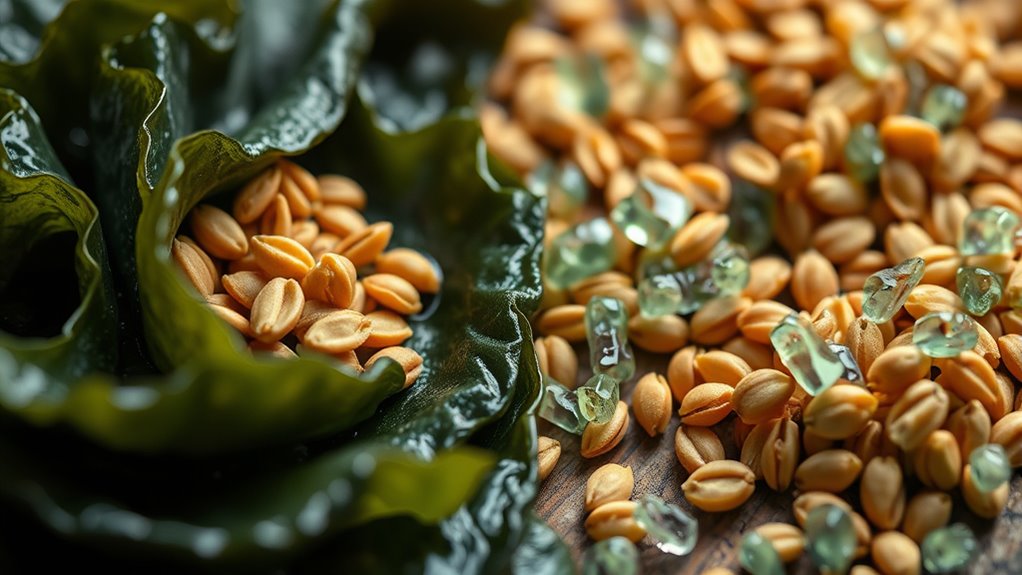
While plant-based sources provide important precursors like ALA, direct intake of DHA and EPA—the forms most readily used by your body—can be challenging through diet alone. That’s where algae come in. Algae cultivation is a sustainable way to produce these essential omega-3 fats directly, bypassing the need for fish. Certain microalgae naturally synthesize DHA and EPA through a process called DHA synthesis, allowing them to generate these fats efficiently. When you consume algae-based supplements or foods fortified with algae oil, you’re getting a reliable source of preformed DHA and EPA. This approach guarantees your body can easily access and utilize these crucial omega-3s, supporting your brain, heart, and overall health on a vegan diet. Additionally, understanding interior design principles can help optimize the storage and presentation of these supplements at home. Incorporating algae-derived omega-3s leverages microalgae biosynthesis, making them a sustainable and effective alternative to fish-based sources.
Seeds and Nuts Rich in Omega‑3 Fatty Acids

Seeds and nuts are excellent plant-based sources of omega-3 fatty acids, making them a convenient addition to a vegan diet. Different seed varieties and nut types provide varying amounts of alpha-linolenic acid (ALA), a essential omega-3 form. Flaxseeds are among the richest, offering a high concentration of ALA. Chia seeds also pack a punch and are easy to incorporate into smoothies or oatmeal. Walnuts, a popular nut type, are notable for their omega-3 content and can be added to salads or snacks. Incorporating these seeds and nuts into your meals boosts omega-3 intake naturally, supporting overall health on a vegan diet. Understanding the Vortex concept can deepen your connection to your health goals and promote a more mindful approach to nutrition. Additionally, leadership skills such as strategic planning and goal setting can help you stay committed to healthy habits. When selecting seeds and nuts, consider their cost-effectiveness, as they are often affordable and widely available, making consistent inclusion easier. Exploring nutritional profiles can help you choose the best options for maximizing omega-3 intake. Being aware of environmental impacts, like deforestation, can also guide more sustainable food choices.
Incorporating Seaweed Into Your Meals
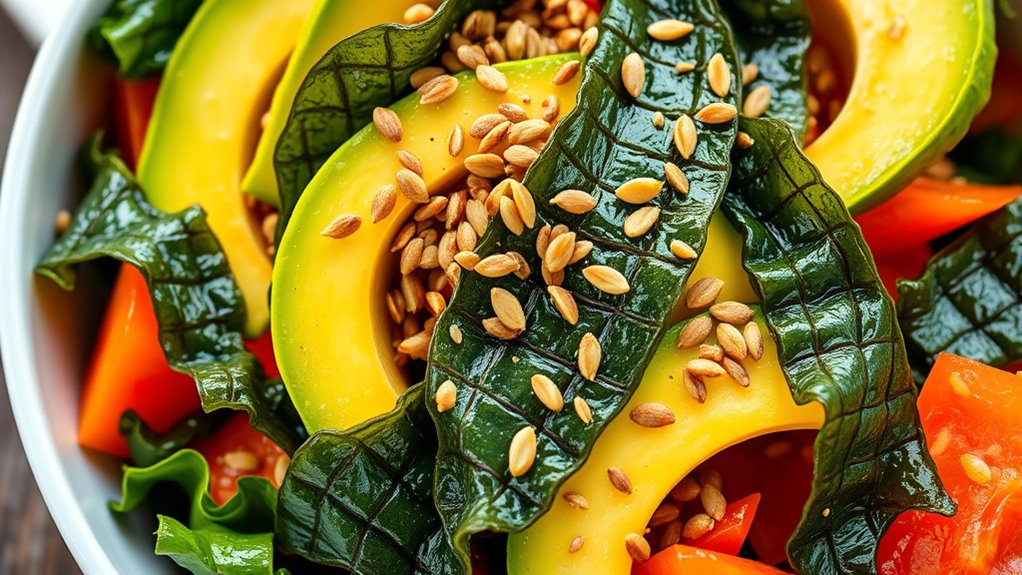
Incorporating seaweed into your meals is an easy way to boost your omega-3 intake and enjoy its nutritional benefits. You can explore different types like nori, wakame, or kelp and add them to soups, salads, or wraps. These versatile seaweeds are rich in vitamins, minerals, and essential fatty acids, making them a valuable addition to your vegan diet. Additionally, seaweed contains Home Furnishings, which can enhance the nutritional information and recipe suggestions tailored to your dietary needs. To further optimize your meals, consider using vertical storage solutions to keep your seaweed and other ingredients fresh and accessible. Incorporating nutrient-dense ingredients like seaweed can support your overall health and well-being.
Types of Edible Seaweed
Seaweed offers a variety of delicious and nutrient-dense options to include in your vegan diet, especially for boosting omega-3 intake. Among these, different kelp varieties stand out for their mineral content and versatility. Nori benefits make it a popular choice for wraps and sushi, thanks to its mild flavor and crisp texture. Wakame adds a subtly sweet flavor to soups and salads, while dulse provides a chewy texture and can be eaten as a snack or added to dishes. Each type of edible seaweed brings unique nutrients and flavors, making it easy to diversify your meals. Incorporating these options helps you enjoy the omega-3 benefits of seaweed while enhancing your dishes with vibrant, savory flavors. Additionally, including various dog beds for Golden Retrievers can support your pet’s comfort as you explore new culinary adventures. In addition, choosing sustainable harvesting practices ensures that seaweed remains a healthy and environmentally friendly resource for future generations.
Ways to Incorporate Seaweed
Adding seaweed to your meals is a simple way to boost your omega-3 intake and enjoy its unique flavors. You can sprinkle dried seaweed flakes over salads, soups, or rice bowls to add a savory, umami taste. Incorporating seaweed into smoothies or blending it into pesto can also mask its flavor while providing nutritional benefits. To maximize freshness, consider harvesting methods like hand-harvesting wild seaweed or purchasing sustainably farmed varieties. Different harvesting methods influence the seaweed flavor, with wild seaweed offering a more robust, oceanic taste. Experimenting with various types and preparation styles allows you to enjoy seaweed’s versatility and health benefits without overwhelming your palate. It’s an easy, natural way to incorporate more omega-3s into your vegan diet.
Nutritional Benefits of Seaweed
Because seaweed is packed with essential nutrients, it’s a valuable addition to your vegan diet. It provides a rich source of seaweed antioxidants that help combat oxidative stress, supporting your overall health. The high seaweed fiber content promotes healthy digestion and aids in maintaining steady energy levels. Additionally, seaweed offers indispensable minerals like iodine, calcium, and magnesium, essential for your metabolic and bone health. Incorporating seaweed into your meals can boost your nutrient intake naturally and sustainably. You can enjoy it in salads, soups, or snacks. Its unique umami flavor enhances various dishes while delivering powerful antioxidants and fiber. Making seaweed a regular part of your diet helps you maximize these nutritional benefits effortlessly.
Omega‑3-Enriched Plant Oils
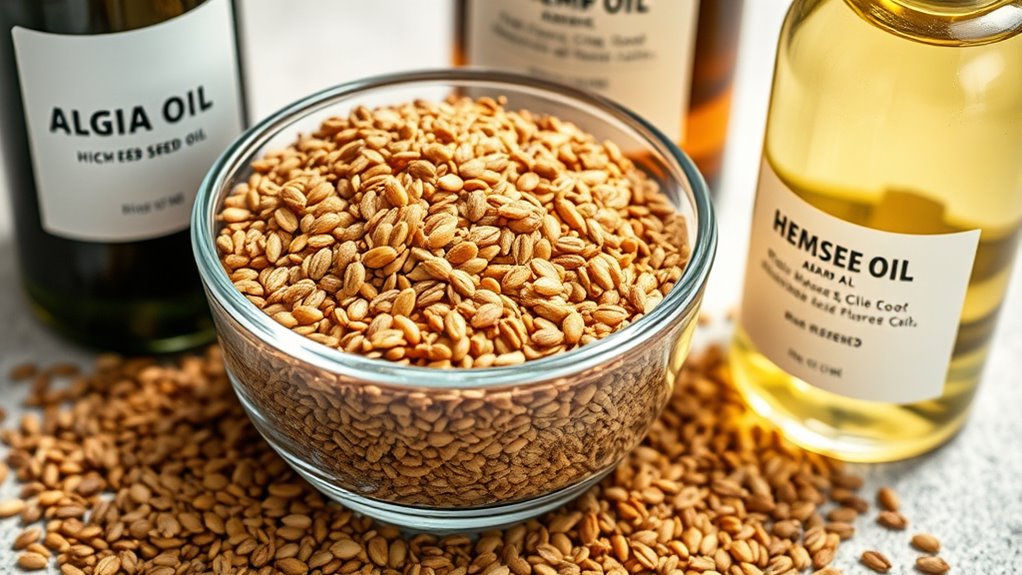
Omega-3-enriched plant oils offer a practical solution for vegans seeking to boost their intake of EPA and DHA. These oils, often derived from algae or specially fortified seeds, help you improve your omega balance without relying on fish oil. They provide a convenient way to incorporate essential fatty acids into your diet.
| Source | Benefits |
|---|---|
| Algal oil | Rich in EPA and DHA, sustainable, vegan-friendly |
| Flaxseed oil | High in ALA, supports conversion to EPA/DHA |
| Chia seed oil | Omega-3 source, easy to add to meals |
| Hemp oil | Balanced omega-6 and omega-3 |
| Walnut oil | Contains ALA, promotes heart health |
Choosing these oils helps you maintain ideal omega levels while respecting vegan principles.
Innovative Vegan Supplements and Fortified Foods
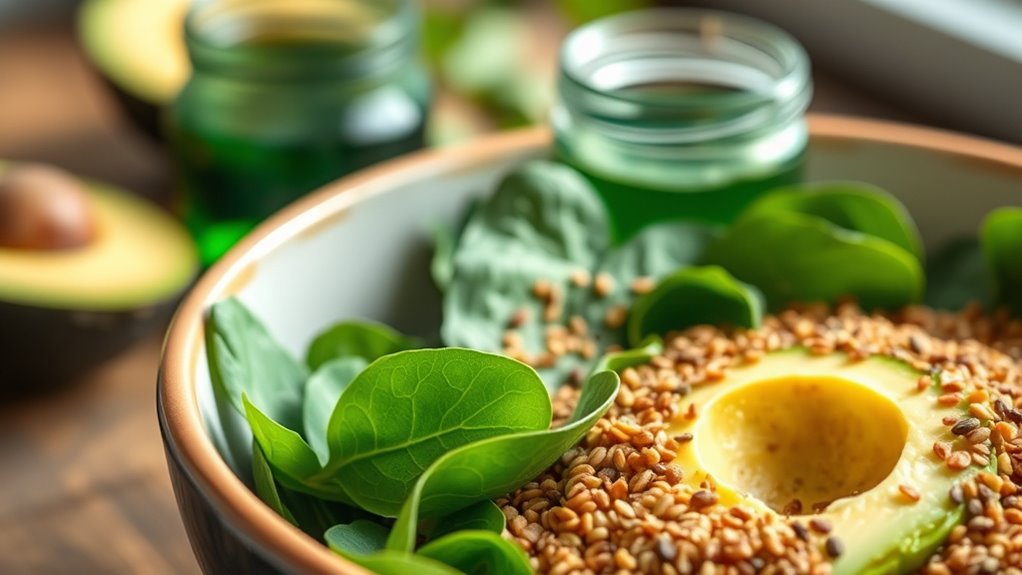
Innovative vegan supplements and fortified foods have emerged as effective ways to guarantee adequate omega-3 intake without relying on traditional sources. These options make it easier to meet your nutritional needs while sticking to a plant-based lifestyle. Marine algae supplements provide a direct plant-based source of EPA and DHA, similar to fish oils but suitable for vegans. Fortified foods, like plant milks and cereals, now often contain added omega-3s, helping you incorporate them into your daily diet effortlessly. Some products even combine multiple sources for maximum absorption. Exploring these options guarantees you stay healthy without compromising your ethics or dietary preferences.
- Marine algae capsules rich in EPA and DHA
- Omega-3 fortified plant milks and yogurts
- Fortified breakfast cereals and bars
- Omega-3-enriched vegan spreads
Tips for Maximizing Absorption of Plant-Based Omega‑3s

To maximize the absorption of plant-based omega-3s, it’s essential to pair them with fat-containing foods, since omega-3 fatty acids are fat-soluble and require dietary fat for ideal uptake. When preparing your meals, use healthy cooking techniques like sautéing seeds or adding oils to salads and grains to enhance absorption. Avoid overcooking, as high heat can degrade omega-3s. Proper storage methods also matter; keep seeds, algae oils, and fortified foods in airtight containers away from light and heat to preserve their nutrient quality. Incorporate fats like avocado, nuts, or olive oil into your meals alongside omega-3-rich ingredients. These practices help your body efficiently absorb and utilize plant-based omega-3s, maximizing their health benefits.
Balancing Omega‑3 Intake With Other Nutrients
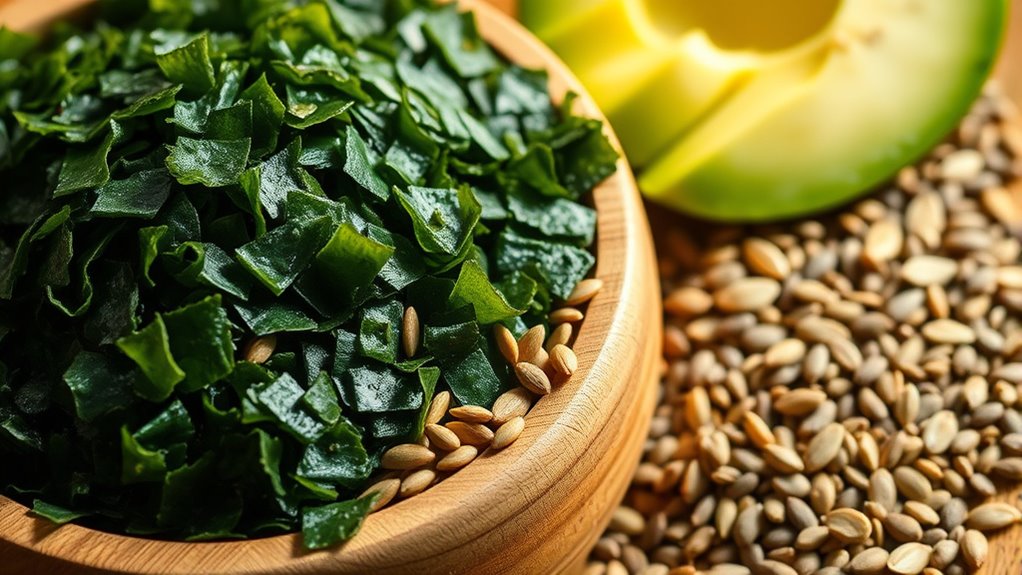
Balancing your omega-3 intake with other nutrients is crucial to support ideal health and maximize benefits. Properly combining omega-3s with nutrients like vitamin D and calcium enhances absorption and bone health. For example, omega-3 and vitamin D work together to boost immune function and reduce inflammation, especially on a vegan diet. Similarly, pairing omega-3s with calcium supports strong bones and prevents deficiencies. To enhance nutrient synergy, consider adding fortified plant milks or leafy greens. Incorporate these strategies:
- Consume omega-3-rich foods alongside vitamin D sources like fortified foods or sunlight
- Combine omega-3s with calcium-rich foods such as kale or fortified plant milks
- Avoid excessive intake of processed foods that hinder nutrient absorption
- Balance omega-3 intake with other micronutrients for overall health
This approach helps ensure your vegan diet supports ideal nutrient balance.
Frequently Asked Questions
Can Vegans Meet Omega-3 Needs Without Supplements?
You can meet your omega-3 needs without supplements by focusing on plant-based omega-3 sources. Incorporate vegan dietary sources like flaxseeds, chia seeds, walnuts, and hemp seeds into your meals. These foods provide alpha-linolenic acid (ALA), a type of omega-3. While your body converts ALA into the active forms, EPA and DHA, consuming a variety of these sources helps guarantee you get enough omega-3s on a vegan diet without needing supplements.
Are Algae-Based Omega-3 Supplements as Effective as Fish Oils?
You might worry algae-based omega-3 supplements aren’t as effective as fish oil, but research shows they’re quite comparable. Fish oil vs algae, both provide EPA and DHA, essential for health. Algae-based supplements often have better supplement bioavailability, meaning your body absorbs them efficiently. So, you can confidently choose algae-based omega-3s to meet your needs without sacrificing effectiveness or compromising your vegan lifestyle.
How Do Cooking Methods Affect Omega-3 Levels in Plant Foods?
Cooking techniques considerably impact nutrient retention, including omega-3 levels in plant foods. You should choose gentle methods like steaming or baking to preserve these healthy fats, as high heat and prolonged cooking can degrade omega-3s. Avoid boiling or frying at high temperatures, which may cause nutrient loss. By selecting appropriate cooking techniques, you can maximize omega-3 retention and enjoy the health benefits of plant-based sources.
What Are the Best Plant Sources for Omega-3 During Pregnancy?
Did you know that plant-based omega-3s can support healthy fetal development? During pregnancy, you should prioritize sources like flaxseeds, chia seeds, hemp seeds, walnuts, and algae oil, as they’re rich in essential DHA and ALA. These foods boost prenatal nutrition and provide critical omega-3s without animal products. Incorporate them into your diet to guarantee ideal brain and eye development for your baby.
Are There Any Potential Side Effects of High Omega-3 Intake From Plants?
You might wonder if eating lots of plant-based omega-3s causes side effects. While generally safe, high omega-3 intake can lead to omega 3 toxicity, causing bleeding or immune issues. It can also create a nutrient imbalance if it replaces other essential fats. To stay safe, balance your intake with a variety of foods and consult a healthcare professional if you’re considering large amounts.
Conclusion
Remember, you are what you eat, so prioritize your omega-3 intake for maximum health. Incorporate algae, seeds, nuts, and fortified foods into your vegan diet to guarantee you get enough DHA and EPA. With a little planning, you can thrive on plant-based omega-3s and support your wellness journey. As the saying goes, “You are what you eat,” so choose wisely and nourish your body from the inside out.
Hi, I’m Alexander. I’m a vegan of over 20 years, and I initially made the switch for health reasons. However, as time went on, I became more and more passionate about the ethical and environmental implications of leading a vegan lifestyle.
I am the author of The Graceful Kitchen, a vegan blog where I share recipes for delicious and nutritious vegan meals. As someone who is deeply committed to living a cruelty-free life, I am also a strong advocate for using whole foods as the foundation of a healthy diet – and believe that going vegan is one of the best ways to achieve this.
